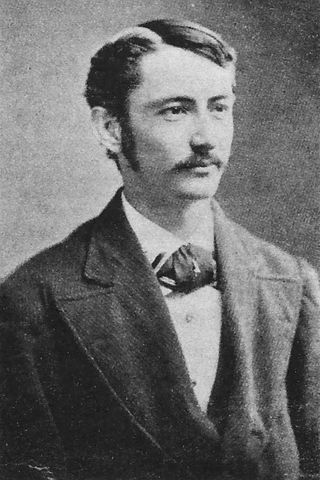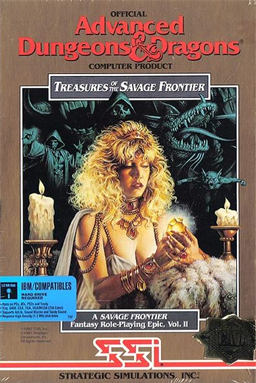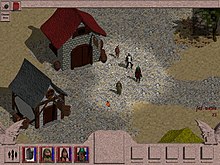
A live action role-playing game (LARP) is a form of role-playing game where the participants physically portray their characters. The players pursue goals within a fictional setting represented by real-world environments while interacting with each other in character. The outcome of player actions may be mediated by game rules or determined by consensus among players. Event arrangers called gamemasters decide the setting and rules to be used and facilitate play.

A player character is a fictional character in a video game or tabletop role-playing game whose actions are controlled by a player rather than the rules of the game. The characters that are not controlled by a player are called non-player characters (NPCs). The actions of non-player characters are typically handled by the game itself in video games, or according to rules followed by a gamemaster refereeing tabletop role-playing games. The player character functions as a fictional, alternate body for the player controlling the character.

A role-playing game is a game in which players assume the roles of characters in a fictional setting. Players take responsibility for acting out these roles within a narrative, either through literal acting or through a process of structured decision-making regarding character development. Actions taken within many games succeed or fail according to a formal system of rules and guidelines.

Pool of Radiance is a role-playing video game developed and published by Strategic Simulations, Inc (SSI) in 1988. It was the first adaptation of TSR's Advanced Dungeons & Dragons (AD&D) fantasy role-playing game for home computers, becoming the first episode in a four-part series of D&D computer adventure games. The other games in the "Gold Box" series used the game engine pioneered in Pool of Radiance, as did later D&D titles such as the Neverwinter Nights online game. Pool of Radiance takes place in the Forgotten Realms fantasy setting, with the action centered in and around the port city of Phlan.
In tabletop games and video games, a character class is an occupation, profession, or role assigned to a game character to highlight and differentiate their abilities and specializations.
Dating sims, or romance simulation games, are a video game subgenre of simulation games with romantic elements. While dating sims share a similar visual presentation as visual novels, they are distinct genres. Dating sims are largely dependent on statistics, while visual novels focus on telling a branching story. Nevertheless, the term "dating sim" has become a generic term for romance-driven games in the West.

William Arthur "Candy" Cummings was an American professional baseball player. He played as a pitcher in the National Association of Professional Base Ball Players, and National League. Cummings is widely credited with inventing the curveball. He was elected to the Baseball Hall of Fame in 1939.
The druid is a playable character class in the Dungeons & Dragons fantasy role-playing game. Druids wield nature-themed magic. Unlike clerics, druids do not have special powers against undead and, in some editions, cannot use metal armor. Druids have a unique ability that allows them to change into various animal forms, and various other qualities that assist them in natural settings.
Miniatures games are a form of tabletop game which prominently features the use of miniature models or figures.
A metagame is a game about a game, or an approach to playing a game. A metagame can serve a broad range of purposes, tied to the way a game relates to various aspects of life.

Treasures of the Savage Frontier (1992) is a Gold Box Dungeons & Dragons role-playing video game. It was developed by Beyond Software and published by SSI for the Amiga and DOS.
The barbarian is a playable character class in the Dungeons & Dragons fantasy role-playing game. The class was introduced in 1985 and went through a number of variations in subsequent editions of the game.

Role-playing games (RPGs) have developed specialized terminology. This includes both terminology used within RPGs to describe in-game concepts and terminology used to describe RPGs. Role-playing games also have specialized slang and jargon associated with them.

Character creation is the process of defining a player character in a role-playing game. The result of character creation is a direct characterization that is recorded on a character sheet. This may include a representation of the character's physical, mental, psychological, and social attributes and skills in terms of the specific game's mechanics. It may also include informal descriptions of the character's physical appearance, personality, personal back-story ("background"), and possessions. Games with a fantasy setting may include traits such as race, class, or species. Character creation is the first step taken by the players in preparation for a game.

William Glenn Killinger was an American football, basketball, and baseball player, coach, and college athletics administrator from Harrisburg, Pennsylvania. He graduated Harrisburg Technical High School and then lettered in three sports at Pennsylvania State University, where he was an All-American in football in 1921. Killinger then played in the National Football League (NFL) for the Canton Bulldogs and the New York Giants and for Philadelphia Quakers of the first American Football League in 1926. Killinger served as the head football coach at Dickinson College (1922), Rensselaer Polytechnic Institute (1927–1931), Moravian College (1933), West Chester University, and with the North Carolina Pre-Flight School (1944), compiling a career college football head coaching record of 176–72–16. He was inducted to the College Football Hall of Fame as a player in 1971.
In the Dungeons & Dragons fantasy role-playing game, a magic item is any object that is imbued with magic powers. These items may act on their own or be the tools of the character possessing them. Magic items have been prevalent in the game in every edition and setting, from the original edition in 1974 until the modern fifth edition. In addition to jewels and gold coins, they form part of the treasure that the players often seek in a dungeon. Magic items are generally found in treasure hoards, or recovered from fallen opponents; sometimes, a powerful or important magic item is the object of a quest.

Menzoberranzan is a 1994 role-playing video game created by Strategic Simulations (SSI) and DreamForge Intertainment. Menzoberranzan uses the same game engine as SSI's previous game, Ravenloft: Strahd's Possession (1994), and is set in the Advanced Dungeons & Dragons Forgotten Realms campaign setting.

A tabletop role-playing game, also known as a pen-and-paper role-playing game, is a classification for a role-playing game (RPG) in which the participants describe their characters' actions through speech, and sometimes movements. Participants determine the actions of their characters based on their characterization, and the actions succeed or fail according to a set formal system of rules and guidelines, usually containing Dice-Rolling. Within the rules, players have the freedom to improvise; their choices shape the direction and outcome of the game.

A non-player character (NPC) is any character in a game that is not controlled by a player. The term originated in traditional tabletop role-playing games where it applies to characters controlled by the gamemaster or referee rather than by another player. In video games, this usually means a character controlled by the computer that has a predetermined set of behaviors that potentially will impact gameplay, but will not necessarily be the product of true artificial intelligence.
Harold "Hal" Erickson is a media historian who was a senior editor at AllRovi for 15 years starting in 1994 when it was known as "All Movies".








